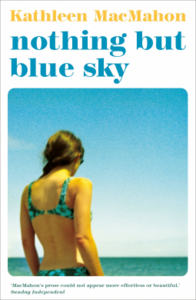Take a photo of a barcode or cover
This book has some of the most subtle moments of heartbreak and hope that had me sobbing (or trying very hard not to on the bus). I think this is probably a great book to read if you're dealing with grief.
Ehkä juuri MacMahonin romaanin tasapainoisuutta on kiittäminen siitä, että se tuntuu niin todelliselta. Fiktion viitta leijuu päähenkilö Davidin elämän yllä, mutta se mitä David kokee ja miten hän tässä maailmassa on, on totta ja tapahtuu juuri sillä hetkellä, kun minä hänestä luen.
David ja Mary Rose ovat olleet onnellinen aviopari. Luonteiltaan he ovat vastakkaisia: David ärtyvä ja negatiivinen, Mary Rose iloa löytävä ja hyvään uskova. He ovat täydentäneet toisiaan tavalla, joka on tehnyt heidän tarinastaan rakkaustarinan mitä suuremmassa määrin.
Kunnes.
Kunnes Mary Rose matkustaa Egyptiin ja lentokone putoaa. Äkkiä David on yksin valtavan surun ympäröimänä. Hän matkustaa ystäviensä kanssa lomamatkalle, mutta ilman Mary Rosea kaikki on vain kalpeaa heijastusta entisestä.
“I understood for the first time how correct it was to say that she was 'survived by her husband'. I had seen that expression used in obituaries without ever giving it a thought, but it turned out to be a term of great precision. I had survived Mary Rose only barely. I was struggling to survive her.”
Nothing but blue sky on ensimmäinen lukemani romaani, jossa viitataan suoraan myös niin Pariisin kuin Nizzankin terrori-iskuihin. Davidin yksityisen surun vierellä häälyy kollektiivinen suru.
Jotain isoa on myös siinä, että David unelmoi nuorena lentäjän urasta, kun taas Mary Rose pelkäsi lentämistä.
MacMahonin teksti tunkeutuu minuun pikkuhiljaa. Se välttää rytinää. Tutustun Davidiin, jonka tunteettomuus ja kylmyys muita ihmisiä kohtaan päättyy vaimon kuolemaan. Tuntuu kuin vaimo jättäisi valonsa Davidille. Se ei tarkoita, että Davidin surusta tulisi helpompaa, mutta elämän sinnikkyydellä se alkaa muuttaa Davidia.
Teoksen alussa Mary Rose on hirmuisen läsnä, vaikka onkin kuollut. Hän on jokaisessa lauseessa, jokaisessa Davidin katseessa ja hänen murtumisensa hetkessä.
Nothing but blue sky kuvaa, miten lapsuudenperhe vaikuttaa ihmiseen. Minkälaiset eväät se hänelle antaa. Davidin kohdalla kotoa saatu perintö tiivistyy lauseeseen
”I had no template for happiness.”
Jo hänen lapsenmielensä on imenyt pessimistisen tavan nähdä maailma, häneen on juurrutettu ajatus siitä, että itsestään ei pidä kuvitella liikoja.
Mary Rosen perhe on välittänyt tyttärelleen hyvin erilaisen henkisen perinnön. Valoa, iloa, uskoa itseen ja omiin kykyihin. Nothing but Blue Skyn alussa David on tiukalla surusta kudotulla kerällä, mutta sivu sivun jälkeen se alkaa - toki usein tuskallisen hitaasti - purkautua.
Kun yllättävät käänteet saavat otteen Davidin elämästä hän rupeaa hahmottumaan kukkana, joka oltuaan vuosia nupulla alkaa vihdoin avata terälehtiään.
Ja niin, äkkiä läsnäolevin on se outouden tunne, joka syntyy siitä, että elämä on ihmeellistä ja surullista samaan aikaan.
David ja Mary Rose ovat olleet onnellinen aviopari. Luonteiltaan he ovat vastakkaisia: David ärtyvä ja negatiivinen, Mary Rose iloa löytävä ja hyvään uskova. He ovat täydentäneet toisiaan tavalla, joka on tehnyt heidän tarinastaan rakkaustarinan mitä suuremmassa määrin.
Kunnes.
Kunnes Mary Rose matkustaa Egyptiin ja lentokone putoaa. Äkkiä David on yksin valtavan surun ympäröimänä. Hän matkustaa ystäviensä kanssa lomamatkalle, mutta ilman Mary Rosea kaikki on vain kalpeaa heijastusta entisestä.
“I understood for the first time how correct it was to say that she was 'survived by her husband'. I had seen that expression used in obituaries without ever giving it a thought, but it turned out to be a term of great precision. I had survived Mary Rose only barely. I was struggling to survive her.”
Nothing but blue sky on ensimmäinen lukemani romaani, jossa viitataan suoraan myös niin Pariisin kuin Nizzankin terrori-iskuihin. Davidin yksityisen surun vierellä häälyy kollektiivinen suru.
Jotain isoa on myös siinä, että David unelmoi nuorena lentäjän urasta, kun taas Mary Rose pelkäsi lentämistä.
MacMahonin teksti tunkeutuu minuun pikkuhiljaa. Se välttää rytinää. Tutustun Davidiin, jonka tunteettomuus ja kylmyys muita ihmisiä kohtaan päättyy vaimon kuolemaan. Tuntuu kuin vaimo jättäisi valonsa Davidille. Se ei tarkoita, että Davidin surusta tulisi helpompaa, mutta elämän sinnikkyydellä se alkaa muuttaa Davidia.
Teoksen alussa Mary Rose on hirmuisen läsnä, vaikka onkin kuollut. Hän on jokaisessa lauseessa, jokaisessa Davidin katseessa ja hänen murtumisensa hetkessä.
Nothing but blue sky kuvaa, miten lapsuudenperhe vaikuttaa ihmiseen. Minkälaiset eväät se hänelle antaa. Davidin kohdalla kotoa saatu perintö tiivistyy lauseeseen
”I had no template for happiness.”
Jo hänen lapsenmielensä on imenyt pessimistisen tavan nähdä maailma, häneen on juurrutettu ajatus siitä, että itsestään ei pidä kuvitella liikoja.
Mary Rosen perhe on välittänyt tyttärelleen hyvin erilaisen henkisen perinnön. Valoa, iloa, uskoa itseen ja omiin kykyihin. Nothing but Blue Skyn alussa David on tiukalla surusta kudotulla kerällä, mutta sivu sivun jälkeen se alkaa - toki usein tuskallisen hitaasti - purkautua.
Kun yllättävät käänteet saavat otteen Davidin elämästä hän rupeaa hahmottumaan kukkana, joka oltuaan vuosia nupulla alkaa vihdoin avata terälehtiään.
Ja niin, äkkiä läsnäolevin on se outouden tunne, joka syntyy siitä, että elämä on ihmeellistä ja surullista samaan aikaan.
emotional
funny
hopeful
reflective
sad
medium-paced
Plot or Character Driven:
Character
Strong character development:
Yes
Loveable characters:
Yes
Diverse cast of characters:
No
Flaws of characters a main focus:
Yes
A gentle story, with a complicated protagonist. Not very plot-driven, but I found the question of what happened to Mary Rose and their marriage compelling.
This was a mostly quiet meditation on a marriage and how our upbringing shapes who we are and how we interact with friends and lovers. I read half of this in print and listened to the rest on audio when I didn't think I had enough "sit down time" before our book club discussion. I enjoyed both formats, and of course, Stephen Hogan does a brilliant job at narrating this story - he has the perfect accent and voice for it, so 10/10 for casting him as narrator.
I am surprised that this didn't make the shortlist for last year's Women's Prize as it is so well written and lent itself to a great discussion for exactly that readership.
I am surprised that this didn't make the shortlist for last year's Women's Prize as it is so well written and lent itself to a great discussion for exactly that readership.
emotional
hopeful
reflective
sad
slow-paced
Plot or Character Driven:
Character
Strong character development:
Yes
Loveable characters:
Yes
Diverse cast of characters:
Yes
Flaws of characters a main focus:
Complicated
Kind of blown away at the way she writes - second book I’ve read of hers and I wish she had a vast library. There’s no pretension and there’s no complication but she manages to write complexities very simply.
I was given a copy of this to read from Netgalley. It took me a little while to get into this. David, the narrator, was someone I found difficult to like at first. Then I realised why and suddenly it changed everything. This book is a fantastic exploration of grief and what it means to lose someone who allowed you to exist in a certain way and how you have to face not just the loss of that person but also the person you are yourself now that they are gone. It's tender and clever and gut wrenching and rather lovely.
emotional
hopeful
reflective
sad
slow-paced
Plot or Character Driven:
Character
Strong character development:
Yes
Loveable characters:
Yes
Diverse cast of characters:
No
Flaws of characters a main focus:
Yes
This was just a fabulous read. The story of a man whose wife has died unexpectedly recalling and recounting the years of their marriage doesn’t sound particularly enthralling but really it was. And it left me feeling uplifted as well. I’m not sure I can explain why I thought most of the book worked so well. David and Mary Rose had one of those relationships that looks impossibly perfect to a lot of people, and that, of course, has it’s cracks on the inside, but it’s not a book that exposes the rot within, it just shows something that seemed very realistic.
I liked the way that the narrative of the marriage unfolded in more or less chronological order but was told from David’s viewpoint as he tried to come to terms with it. In particular I loved all the supporting characters. The families and the friends, both how they were when Mary Rose was alive and how they responded to her death. There was a part at the end of the book that seemed, maybe a bit too neat, but it certainly wasn’t unrealistic, perhaps it could have been foreshadowed a little. But it worked with the story and overall I enjoyed the book a lot.
Definitely an author I’ll look out for again, I really liked her storytelling style.






